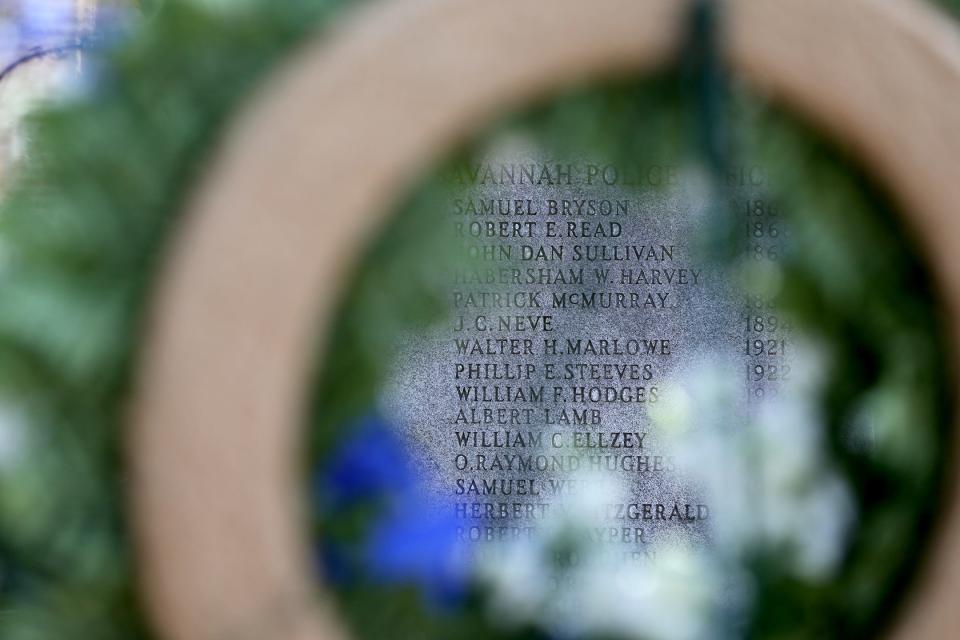'Lest We Forget.' Historian disinters the memory of Savannah’s earliest police fatalities
This is a commentary by Mark Clark O’Dell, a local historian.
On April 7, 1866, Savannah policemen, James Foley and Edward G. McNichols, were fatally shot attempting to arrest a drunken man at the corner of West Broad and Liberty Streets. Their assailant, George W. Grady was an off-duty Savannah cop.
McNichols and Foley are Savannah’s forgotten police officers. Although the Savannah Police Department has held an annual memorial for its fallen members since 1965, these two men remained missing from the roll call. Until now, their story has eluded historians of Savannah. The recent discovery of these tragic deaths demonstrates that profound moments in history can be forgotten.
More: Savannah Police officers honored at ceremony 156 years after being shot by fellow officer

In 1865, Chief Robert Anderson reorganized the Savannah Police Department. McNichols and Foley, two Irish immigrants, were among those sworn in after paying a bond which helped to ensure the policemen’s orderly conduct. The police department was not yet a modern professional organization and discipline amongst the ranks was a problem.
In addition to the bonds, Chief Anderson imposed fines for any police negligence. Despite those measures,ruffians and drunks found their way into the newly reorganized force. During his brief stint in the department, another recruit, James Bartley, conducted himself so as not to bring questions to his character. Chief Anderson later testified that Bartley was one of the most soldierly and well-disciplined of his policemen.
However, Bartley hid a violent past and his real identity. James Bartley’s real name was George W. Grady. He kept up this facade, using several aliases throughout his months in the police force and even partway through his murder trial.
Town hall of history: Tybee's old city hall added to National Register of Historic Places
What happened?
On April 7, 1866, Policeman Grady reported to the police barracks on Habersham Street. His instructions were to stay on the premises until his midnight shift patrolling one of Savannah’s residential wards. Instead, Grady left the confines of the barracks and went on a drinking spree with friends.
Grady’s intoxication came to a head at Mr. Neville’s bar near the Central Railroad Depot. Grady got into a verbal argument which caused the owner to force the crowd out of his bar. Grady began brandishing his police-issued-pistol claiming he could kill anyone.
Enter McNichols, who attempted to calm Grady and secure the pistol. As Policeman James Galoglay joined into the tussle, Grady got his arm free and pointed the revolver directly at McNichols. His first shot pierced McNichols’ chest. Grady then turned toward Galoglay and James Foley who was approaching the scene. His second shot grazed Policeman Galoglay and struck the hand of Foley. A third shot hit Foley directly in his chest, killing him.
Galoglay then tackled and subdued Grady. As Grady was being arrested, another pistol fell from his waistband.
McNichols and Foley were laid to rest in the Catholic Cemetery on April 9 in unmarked graves. McNichols’ wife, Mary Stafford, lived in Savannah as a widow with her cousin Richard Cornish until her death in 1882. Nothing is known about Foley’s widow, Mary King.
Grady was charged with the murder and tried in April 1868. His defense team consisted of well-known Savannah attorney Julian Hartridge and Judge Henry Rootes Jackson. During the trial, Grady revealed his true persona. His past was the only thing that could explain his violent actions.

Grady's troubled past
Grady was born in Georgia and raised in Tennessee. When the Civil War broke out, Grady was in Ringgold, Georgia where he was shot in an altercation. Most of the shot was removed by a doctor, but pieces remained in his skull. Grady avoided further problems by joining the 9th Georgia Infantry Regiment on its way to Virginia. He was wounded twice during battles at Seven Pines and Murfreesboro. After his second injury, he left his regiment and never returned. '
According to Grady’s court statement, he went on to volunteer for a Confederate Tennessee Calvary unit. However, Civil War records indicate that he deserted the Confederacy and signed an oath of allegiance to the United States at Chattanooga on September 27, 1864. His status as a traitor in the eyes of the South’s postwar white society is likely the cause for his identity change and alias after the war.
Grady claimed the shot in his head caused him to become a maniac when he drank whiskey. Hartridge’s arguments evoked sympathy for the prisoner and his closing remarks convinced the jury of Grady’s temporary lapse of character. The jury found a verdict of manslaughter.
During the sentencing, Judge W. B. Fleming scolded the prisoner for using his wounds as an excuse for his drunken behavior. He delivered Grady to the Georgia State Prison in Milledgeville for 10 years of hard labor. Grady escaped confinement in May 1869 and was apprehended two months later in Augusta. Grady’s life after his prison term is currently unknown.
Officers get overdue honors
The memorialization of fallen officers evolved slowly over the course of a century. At first, the city paid for police funerals and then approved stipends for widows. It was 100 years before a granite marker inscribed with a list of fallen officers was placed in front of the Police Headquarters.
Since 1965, at Savannah’s Police Memorial Day, a roll call honors those police who died in the line of duty. However, the well-hidden episode of Foley and McNichols' deaths did not present itself and the men remained forgotten. Their graves go unmarked, and their names unspoken.
On the police monument, the phrase "Lest We Forget" charges the community with the responsibly to remember the sacrifice these officers and their families paid. This year, the same honor was extended to these newly discovered fallen officers: James Foley and Edward G. McNichols.
This article originally appeared on Savannah Morning News: Savannah policemen shot and killed in 1866 honored at memorial

